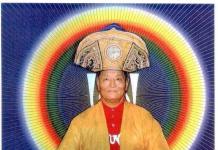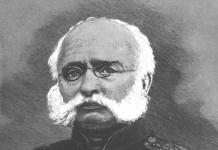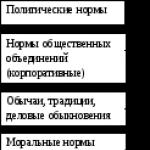Chögyal Namkhai Norbu is the great Dzogchen Teacher of our time.
Born in Tibet in 1938 into an aristocratic and highly spiritual family. When he was two years old, the Nyingma school masters Palyul Karma Jansrid Rinpoche and Shechen Rabjam Rinpoche recognized him as an incarnation of Adzom Drukpa, who was one of the greatest Dzogchen masters of the early twentieth century (1842-1924). And at the age of eight, the Sixteenth Karmapa and Palden Pun Situ Rinpoche recognized him as the incarnation of Ngawang Namgyal Shabdrung Rinpoche (1594-1651). Shabdrung Rinpoche was the historical founder of the state of Bhutan. Until the beginning of the 20th century, the Shabdrung Rinpoches were dharmarajs - the temporal and spiritual rulers of Bhutan.
From a very early age, Namkhai Norbu Rinpoche received numerous transmissions of teachings and empowerments from many famous teachers belonging to different schools of Tibetan Buddhism. At the age of sixteen, he completed a full traditional Buddhist education and was sent to China, where he taught Tibetan at the university and at the same time independently studied Chinese and Mongolian. At the age of seventeen he was recognized as one of the most highly educated Tibetans.
When Namkhai Norbu Rinpoche was 17 years old, following a vision he received in a dream, he went to meet his root Dzogchen Master Zhangchub Dorje Rinpoche (1826-1978), who lived in a secluded valley east of Dege.
Here is what Namkhai Norbu Rinpoche writes about this in his book “The Crystal and the Path of Light”: “ Although I did not yet know it, I was destined by circumstances to meet a special Teacher who would give everything I had learned and experienced a new, deeper perspective, and through meeting him I was able to awaken and come to a correct understanding of the Dzogchen teachings. ...
… I no longer had any doubt that he should be my Teacher, and I stayed with him to receive teaching. The Teacher's name was Zhangchub Dorje, and he looked like a simple Tibetan peasant. Outwardly, his manner of dress and lifestyle were quite ordinary, although in this book I will tell some other stories about him, from which you will understand that his condition was very far from ordinary. His students also lived very modestly, and most of them were simple, far from rich people who grew crops, working in the fields, and at the same time engaged in joint practice.
Zhangchub Dorje was the teacher of Dzogchen, and Dzogchen does not rely on external things: after all, this is the Teaching about the essence of the human condition. Therefore, when later, due to political circumstances, I left Tibet and eventually settled in the West, in Italy, receiving a position as a professor at the Oriental Institute of the University of Naples, I was convinced that although the external conditions and culture here were different from those that surrounded me in Tibet, the fundamental condition of every person is always the same. I became convinced that the Dzogchen teachings are culture-independent and can be studied, understood and practiced in any cultural context".
- In 1958, Namkhai Norbu Rinpoche went to Sikkim (India), where he was forced to stay due to the sharp deterioration of the political situation in Tibet in 1959, and, like many Tibetans, including the Dalai Lama, found refuge in India. In 1960, when he was 22 years old, Professor Giuseppe Tucci invited him to Rome to participate in research at the Institute for the Study of the Far and Middle East.
- In 1962, Namai Norbu Rinpoche received a professorship at the Oriental Institute of the University of Naples (Istituto Universitario Orientale), where he taught Tibetan and Mongolian language and literature.
Namkhai Norbu Rinpoche conducted research into the ancient history of Tibet, carefully studying the autochthonous Bon tradition. His books, which include works on history, medicine, astrology, Bon and folk traditions, are evidence of an intimate knowledge of Tibetan culture and history.
Chögyal Namkhai Norbu is married to an Italian woman and has two adult children.
In the mid-70s, Chogyal Namkhai Norbu began teaching Dzogchen teachings. Before Namkhai Norbu Rinpoche, the Dzogchen teaching was not open to Western people, and the unique opportunity to receive the teaching was greeted with great interest by many people, first in Italy and then in other countries of the world. In 1981, Chögyal Namkhai Norbu founded the Dzogchen Cultural Association, and then the first major international center of teaching appeared in the province of Tuscany. Subsequently, thousands of people in different countries of the world become members of the World Dzogchen Community.
- In 1983, Namkhai Norbu organized the first international congress on Tibetan medicine in Venice. And after some time, he begins to conduct training retreats in different countries, where he gives practical instructions on the practices of Dzogchen, as well as Yantra Yoga, Tibetan medicine and astrology.
- In 1988, Chögyal Namkhai Norbu founded A.S.I.A. (Association for International Solidarity in Asia), a non-governmental organization whose mission was to provide humanitarian assistance, develop social infrastructure, education and medical care in the traditional regions of Tibetan residence.
- In 1989, Chogyal Namkhai Norbu founded the International Institute of Tibetan Studies "Shang Shung", which aims to disseminate knowledge about Tibetan culture and its preservation as an integral and extremely valuable part of the world cultural heritage.
Currently, Namkhai Norbu Rinpoche continues to transmit knowledge of the Dzogchen teachings throughout the world, and we have an incredible opportunity to receive these profound instructions and empowerments.
You can view Chögyal Namkhai Norbu's worldwide travel schedule on the website below.
OM AH HUM!
Namkhai Norbu Rinpoche, Master of Dzogchen wrote in the year 3911 mewa,
or the year of the Tree - the Dog, February 20, 1995, at a New York hospital.
Note,
that Namkhai Norbu Rinpoche turns 80 years old
December 08, 2018!
ILLUSORY BODY
That one. who, like Lord Naropa,
Realized the final meaning of the illusory body
And he has not only a rational understanding of it,
Despite severe leukemia,
There will be no worries or fear.
For someone who, like me, is on the way,
Who is confident in the knowledge of the illusory body,
But I haven’t fully realized it yet,
I'm sure this is an illusory body like a bubble,
Won't stay for long
If leukemia is not treated
An illusory body of flesh and blood,
Depends on time and circumstances
Sometimes healthy. sometimes sick
Any disease can always strike,
Until his material condition is exhausted -
I've heard it's the nature of all things composite
an illusory body of five vital and six hollow organs,
And also made of flesh. bones, blood, skin,
Pure essences and five senses,
The basis of which is Wind, Bile, Mucus.
If his condition is just that.
I think it is important to restore the harmony of the physical elements.
When the buds of this illusory body
They completely refused.
While modern equipment was purifying my blood,
I have reached the border between life and death.
And only thanks to the immeasurable kindness of Samantabhadra the foundations
My body got the chance to live a little longer
Because Santi Maha Sangha(Dzogchen Sangha)
- the only basis for
To the Vortex of Joy of the Dzogchen teachings
Lasted a long time and stayed clean,
Then if this ILLUSORY BODY won't get the opportunity
Stay in good health IN THE EIGHTH TEN,
Will it remain just an idea in my mind?
If I load the illusory body with excessive work,
Besides that. that I won’t achieve the goal myself,
Problems will arise.
If I don't become like a cow in the hands of thieves,
And all men and women interested in the Dzogchen teachings,
They will study and practice in accordance with my understanding,
This will be of great benefit to all of us.
Moreover. that this illusory body will retain temporary health.
And time and place will be associated with the wisdom of energy,
May I have the opportunity to convey
Foundations of Samantabhadra's true state of self-perfection
To all the happy creatures on the five continents of this earth,
And may we all find happiness.
A LA LA HO!
I hope this comes true!

One of the three songs written by Chögyal Namkhai Norbu Rinpoche in 1994-95 while being treated for leukemia at Memorial Sloan Kettering Hospital in the USA. The songs were published in the collection "Songs from the Hospital and Other Poems."

SARVA MANGALAM!
सर्वमङ्गलं ।
Chögyal Namkhai Norbu is the great Dzogchen Teacher of our time.
Born in Tibet in 1938 into an aristocratic and highly spiritual family. When he was two years old, the Nyingma school masters Palyul Karma Jansrid Rinpoche and Shechen Rabjam Rinpoche recognized him as an incarnation of Adzom Drukpa, who was one of the greatest Dzogchen masters of the early twentieth century (1842-1924). And at the age of eight, the Sixteenth Karmapa and Palden Pun Situ Rinpoche recognized him as the incarnation of Ngawang Namgyal Shabdrung Rinpoche (1594-1651). Shabdrung Rinpoche was the historical founder of the state of Bhutan. Until the beginning of the 20th century, the Shabdrung Rinpoches were dharmarajs - the temporal and spiritual rulers of Bhutan.
From a very early age, Namkhai Norbu Rinpoche received numerous transmissions of teachings and empowerments from many famous teachers belonging to different schools of Tibetan Buddhism. At the age of sixteen, he completed a full traditional Buddhist education and was sent to China, where he taught Tibetan at the university and at the same time independently studied Chinese and Mongolian. At the age of seventeen he was recognized as one of the most highly educated Tibetans.
When Namkhai Norbu Rinpoche was 17 years old, following a vision he received in a dream, he went to meet his root Dzogchen Master Zhangchub Dorje Rinpoche (1826-1978), who lived in a secluded valley east of Dege.
Here is what Namkhai Norbu Rinpoche writes about this in his book “The Crystal and the Path of Light”: “ Although I did not yet know it, I was destined by circumstances to meet a special Teacher who would give everything I had learned and experienced a new, deeper perspective, and through meeting him I was able to awaken and come to a correct understanding of the Dzogchen teachings. ...
… I no longer had any doubt that he should be my Teacher, and I stayed with him to receive teaching. The Teacher's name was Zhangchub Dorje, and he looked like a simple Tibetan peasant. Outwardly, his manner of dress and lifestyle were quite ordinary, although in this book I will tell some other stories about him, from which you will understand that his condition was very far from ordinary. His students also lived very modestly, and most of them were simple, far from rich people who grew crops, working in the fields, and at the same time engaged in joint practice.
Zhangchub Dorje was the teacher of Dzogchen, and Dzogchen does not rely on external things: after all, this is the Teaching about the essence of the human condition. Therefore, when later, due to political circumstances, I left Tibet and eventually settled in the West, in Italy, receiving a position as a professor at the Oriental Institute of the University of Naples, I was convinced that although the external conditions and culture here were different from those that surrounded me in Tibet, the fundamental condition of every person is always the same. I became convinced that the Dzogchen teachings are culture-independent and can be studied, understood and practiced in any cultural context".
- In 1958, Namkhai Norbu Rinpoche went to Sikkim (India), where he was forced to stay due to the sharp deterioration of the political situation in Tibet in 1959, and, like many Tibetans, including the Dalai Lama, found refuge in India. In 1960, when he was 22 years old, Professor Giuseppe Tucci invited him to Rome to participate in research at the Institute for the Study of the Far and Middle East.
- In 1962, Namai Norbu Rinpoche received a professorship at the Oriental Institute of the University of Naples (Istituto Universitario Orientale), where he taught Tibetan and Mongolian language and literature.
Namkhai Norbu Rinpoche conducted research into the ancient history of Tibet, carefully studying the autochthonous Bon tradition. His books, which include works on history, medicine, astrology, Bon and folk traditions, are evidence of an intimate knowledge of Tibetan culture and history.
Chögyal Namkhai Norbu is married to an Italian woman and has two adult children.
In the mid-70s, Chogyal Namkhai Norbu began teaching Dzogchen teachings. Before Namkhai Norbu Rinpoche, the Dzogchen teaching was not open to Western people, and the unique opportunity to receive the teaching was greeted with great interest by many people, first in Italy and then in other countries of the world. In 1981, Chögyal Namkhai Norbu founded the Dzogchen Cultural Association, and then the first major international center of teaching appeared in the province of Tuscany. Subsequently, thousands of people in different countries of the world become members of the World Dzogchen Community.
- In 1983, Namkhai Norbu organized the first international congress on Tibetan medicine in Venice. And after some time, he begins to conduct training retreats in different countries, where he gives practical instructions on the practices of Dzogchen, as well as Yantra Yoga, Tibetan medicine and astrology.
- In 1988, Chögyal Namkhai Norbu founded A.S.I.A. (Association for International Solidarity in Asia), a non-governmental organization whose mission was to provide humanitarian assistance, develop social infrastructure, education and medical care in the traditional regions of Tibetan residence.
- In 1989, Chogyal Namkhai Norbu founded the International Institute of Tibetan Studies "Shang Shung", which aims to disseminate knowledge about Tibetan culture and its preservation as an integral and extremely valuable part of the world cultural heritage.
Currently, Namkhai Norbu Rinpoche continues to transmit knowledge of the Dzogchen teachings throughout the world, and we have an incredible opportunity to receive these profound instructions and empowerments.
You can view Chögyal Namkhai Norbu's worldwide travel schedule on the website below.
Copied from the site "Self-knowledge.ru"
Message from Thubten Rabji, Rinpoche's personal assistant
At the end of the morning practice session on Wednesday, February 28, 2018, during the Drubchen Mandarava in Dzamling Gar in Tenerife, Dzamling Gar and Chögyal Namkhai's personal assistant Norbu Thubten Rabji shared news about Rinpoche's health and expressed his view of the current situation to all those present and viewers of the webcast.
I would like to convey to you a message from Rose Namkhai, she has asked me to update you on Rinpoche's health. You've probably already seen my message on Facebook that I wrote a couple of days ago. Rinpoche has the flu and his doctor advised him to stay home and not go anywhere, not even to the doctor. He stayed at home for three days, but there was no significant improvement.
Yesterday (February 27) he was taken to a clinic in the north [Tenerife] and today he is much better, he slept well and ate well. He may need one more day, but we hope he will be back tomorrow. I don't think he's coming back today [Wednesday, February 28] because the doctor wants to make sure he recovers from the flu and has told him to stay with them for a while longer. Here is more or less recent information about the health of Rinpoche from the north of Tenerife. And this is very good news - Rinpoche is feeling much better.
This year he has prepared a very busy schedule, but I think that he simply will not be able to carry it all out. Why did he do this? Rinpoche takes on a very big responsibility. He feels responsible for the entire Dzogchen Community, supporting it throughout the world. The Lings and Gars send him messages and emails telling him how sorry they are that he couldn't come [last year], but are glad he's coming [this year], and how they're looking forward to him. When he receives these letters, he feels that people are really waiting for him and he must come. He sacrifices himself. We need to understand this.
The Dzogchen Community should understand this and not make him feel [responsible]. It is we who must come to Rinpoche to receive teachings. We must prove to him that we are ready to take responsibility for the preservation of the Community - economically, financially and practically. We can prove to him that we are able to take care of the Community and not depend on him for everything. This is what we really need to do. This seems right to me and people should understand this, especially the International Gakyils, local Gakyls, instructors of SMS, Vajra Dance, Yantra Yoga, etc. We [in the Dzogchen Community] have many responsible people and many long-time students of Rinpoche.
Rinpoche has been working on building the Community for over 40 years. Now he deserves a rest, and we must take responsibility and not wait for him to come to us. It is we who must come to him for teaching. This is what we must do, otherwise, it seems to me, [to continue to work like this] is really impossible. I know what Rinpoche's abilities are. Of course, each of us understands that [Master] transcends all boundaries, he is beyond today and tomorrow, life and death, what is right and wrong. He is beyond everything, he is like space. But here we are dealing with something else. We are talking about dharmakaya, sambhogakaya. But Rinpoche has a human body, he is a nirmanakaya, and we want to see him physically. We want to hear the oral transmission from his lips. We want to rejoice with him, we want to touch his body. We want to see him in a human body, and the human body is material. You need to [understand] how to work in such a [situation]. No matter how great his potential is, there are always limitations to his body.
I'm sure he would like to do this two-week retreat without interruption [due to illness], but we see that this is not possible. Thus, each of us needs to take on our personal responsibility, and all of us, if we consider ourselves responsible people, must understand how we can help Rinpoche and take responsibility for the continuation of our world Community, otherwise he will only feel responsible and continue to have a busy schedule, and because of this there will be no end to his health problems. This is not at all good for anyone, and especially for him.
With morning practice Jnana Dakini
South Kunsangar invites members of the Dzogchen Community to its summer camp.
Here we will try to combine collective and personal practice with relaxation in the countryside near the southern coast of Crimea and enjoying the mountain air and space.
All calendar ganapujas and webcasts of the Teachings of Chögyal Namkhai Norbu will be held in the ghar. In addition, there will be various collective practices, if necessary, with an explanation. The practice schedule will be flexible and take into account the wishes of those present in the gar at the time of the weekly planning meeting. Last year's experience showed that a few minutes on a Saturday or Sunday morning can provide a clear and satisfactory schedule for the next week.
South Kunsangar is a wonderful place for personal practice. The wide sky of the Gar, framed only in the distance by low mountains, is especially conducive to Namkha Arte or the practice of Longde. Summer weather in Crimea is usually very favorable for this.
Summer camp participants will be able to stay both in the Gara campsite and in the neighboring village of Goncharnoye.
All questions about how to get to SC and others will be answered by the coordinator of the summer camp in South Kunsangar - Lena +7 978 829 28 92, e-mail: [email protected]
Write if you are planning to come.
Schedule of classes in the gar
Moscow class time




















